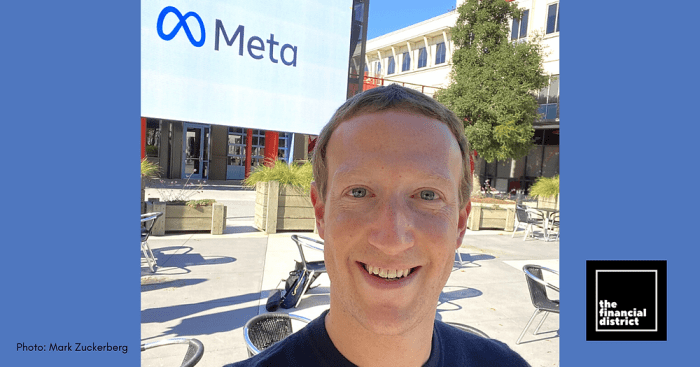Facebook renames itself Meta amid controversy, a bold move that signals a massive shift in strategy for the tech giant. This rebranding, shrouded in speculation and public debate, marks a pivotal moment in the company’s history. From its humble beginnings as a social networking site, Facebook’s evolution has been remarkable, marked by both triumph and tribulation. The decision to pivot towards the metaverse, a virtual reality concept, is the focal point of this re-evaluation.
What were the driving forces behind this transformation? What are the potential implications for the future?
The name change itself sparked a firestorm of discussion. Initial reactions ranged from bewilderment to outright criticism. Was this a calculated attempt to reinvent the company’s image, or a misguided venture into uncharted territory? The answer, as with many complex issues, likely lies somewhere in the middle. This rebranding effort has profound implications not only for Facebook/Meta but also for the broader tech industry and the public’s perception of virtual reality and its potential applications.
Background of the Rename
Facebook, a social media giant, has undergone a significant transformation in its corporate identity. From its humble beginnings as a Harvard University-based platform, the company has evolved into a global phenomenon, reshaping communication and connection. The recent rebranding to Meta reflects a deliberate shift in focus, signaling a bold ambition to move beyond the confines of social networking.The decision to rebrand from Facebook to Meta was not a sudden impulse.
It was the culmination of years of internal discussions, external analysis, and a desire to reposition the company for the future. The rebranding effort aimed to broaden the company’s vision beyond the existing social media landscape, emphasizing its investment in virtual and augmented reality technologies.
Historical Overview of Facebook’s Evolution
Facebook’s journey has been marked by several key milestones. Its initial focus was on connecting university students, but its rapid growth and adoption expanded to encompass a worldwide audience. The introduction of features like the News Feed revolutionized user engagement and the company’s business model. Later acquisitions, such as Instagram and WhatsApp, further cemented its position as a dominant force in digital communication.
- 2004: Launch of Facebook as a platform for Harvard students, marking the beginning of a social media revolution.
- 2006: Introduction of the News Feed, a significant enhancement that revolutionized how users interacted with the platform.
- 2012: Acquisition of Instagram, significantly expanding Facebook’s reach into the realm of photo-sharing.
- 2014: Acquisition of WhatsApp, bolstering Facebook’s position as a key player in messaging applications.
- 2020s: Increased emphasis on virtual and augmented reality technologies, culminating in the rebranding to Meta.
Previous Branding Strategies and Their Impact
Facebook’s initial branding focused on simplicity and accessibility, aiming to attract a broad user base. Its distinctive logo and color scheme became instantly recognizable. The company’s early success can be attributed to this strategy, which resonated with the desire for easy-to-use online connection. However, as the platform matured, criticism arose regarding its data privacy policies and the spread of misinformation.
These challenges ultimately contributed to the company’s evolving strategy and, eventually, the rebrand.
Context Surrounding the Decision to Rebrand
The decision to rebrand was not made in a vacuum. It was a response to several factors. The increasing prevalence of virtual and augmented reality technologies, along with the company’s significant investment in these sectors, was a major driver. Also, criticism regarding Facebook’s influence and potential negative impact on society played a role in the company’s reassessment.
Facebook’s rebranding to Meta amidst controversy is definitely sparking some interesting discussions. It’s a big shift, and while some are intrigued by the company’s vision, others are skeptical. Thinking about the tech world, it’s quite fascinating to compare the features of similar devices, like the Fitbit Sense and the Fitbit Ionic. fitbit sense vs fitbit ionic offers a deep dive into those details, which, in a way, mirrors the complexity of Facebook’s transformation.
Ultimately, the whole Meta situation is a testament to how quickly the tech landscape can evolve and the ongoing challenges of adapting to it.
Timeline of Events Leading Up to the Rebrand
The rebranding process wasn’t instantaneous. Several months of planning, discussions, and internal reviews preceded the official announcement. This included considering various names and conceptualizing the new brand’s identity. Extensive market research and feedback gathering contributed to the company’s final decision.
Announcement and Public Reception
The rebranding announcement was made publicly through various channels, including press releases, social media posts, and company-wide communications. The response from the public was mixed. Some lauded the company’s ambition to venture into new technologies, while others criticized the abrupt change and questioned the long-term viability of the new strategy.
Reasons Behind the Meta Name
Facebook’s rebranding as Meta signaled a significant shift in the company’s vision, moving beyond its social media roots to encompass a broader, more ambitious future in the metaverse. This transformation, however, was met with mixed reactions, raising questions about the company’s true motivations and the long-term viability of its new strategy. The justifications offered for the name change, while seemingly clear, may mask deeper, potentially more complex, aims.The company’s stated rationale for the name change revolved around a desire to position itself as a leader in the development and implementation of the metaverse, a persistent theme in the company’s communications.
This transition was not simply a cosmetic change, but rather a strategic realignment reflecting a fundamental shift in focus. Meta emphasized that the metaverse represents a significant evolution of how people interact and experience technology, suggesting a future where digital spaces are integral to daily life.
Stated Justifications for the Name Change
Meta’s official pronouncements emphasized the company’s vision of a future where the metaverse is the dominant platform for social interaction, commerce, and entertainment. They argued that the “Meta” name better reflects this ambitious vision, highlighting the company’s commitment to building the technologies that will power this future. The shift to a more immersive and integrated digital experience was central to their argument.
This message was often conveyed through presentations emphasizing the potential for social connection, economic opportunities, and new forms of creativity within the metaverse.
Potential Motivations Beyond the Stated Reasons
While Meta emphasized the metaverse, some observers questioned whether the rebranding was primarily driven by a desire to distance the company from the negative connotations associated with its social media past. The increasing scrutiny and criticism of Facebook’s influence and impact on society may have played a role in the decision. The move to a new name could also be seen as a way to rebrand the company’s image and attract a new generation of users and investors, who may be more receptive to the concept of the metaverse.
Rationale Behind Shifting Focus to the Metaverse
Meta’s rationale for shifting its focus to the metaverse was presented as a response to the evolving technological landscape and the growing potential of immersive technologies. The company argued that the metaverse represented a new frontier for innovation and opportunity, allowing for the creation of entirely new experiences and industries. The shift was also presented as a way to leverage existing assets and resources, like its user base, into this new digital frontier.
They argued that the metaverse would be the next stage in human evolution and that they were uniquely positioned to lead the way.
Company’s Vision for the Future as Communicated During Rebranding
The company’s vision for the future, as articulated during the rebranding, emphasized the transformative potential of the metaverse. It envisioned a future where users could interact with digital environments in a truly immersive way, creating new forms of social connection and entertainment. This vision encompassed virtual spaces for work, learning, shopping, and more. The company highlighted examples of potential applications in gaming, education, and business.
They hoped to develop technologies that would allow people to transcend physical limitations and engage with a digital world that is more expansive and dynamic than anything currently possible.
Examples of How the Company Presented Rationale to Stakeholders and Public
Meta communicated its rationale to stakeholders and the public through a variety of channels, including press releases, investor presentations, and social media posts. These communications emphasized the technological advancements driving the metaverse, the potential for new economic opportunities, and the immersive possibilities for user interaction. They often used compelling visuals and interactive demonstrations to showcase the potential of the metaverse and its impact on various aspects of life.
This included demonstrating virtual meetings, shopping experiences, and even virtual concerts.
Public Reaction and Controversy

The rebranding of Facebook to Meta sparked a diverse and often contentious public reaction. While some saw the name change as a bold step into the future, others viewed it with skepticism and even outright criticism. This reaction highlights the complexities of large-scale corporate rebranding and the challenges of adapting to changing technological landscapes.
Public Opinion Comparison
The public response to Meta’s rebranding was far from unanimous. Different groups held varying perspectives, often shaped by their understanding of the company’s intentions and the potential impact on their lives.
| Group | Positive Aspects | Negative Aspects | Neutral Aspects |
|---|---|---|---|
| Social Media Users | Potential for new and innovative products, expanded horizons for the company | Loss of brand recognition, uncertainty about the future direction of the platform, lack of clarity on the new company’s mission | Interest in the new vision, waiting to see how the rebranding will play out in practice |
| Analysts | Possibility of a shift in market dominance and increased focus on the metaverse | Concerns about the execution of the metaverse vision, potential dilution of Facebook’s core strengths, and the financial risks involved | Uncertainty regarding the long-term impact of the rebranding, cautious optimism about the future potential |
| Media Outlets | The rebranding as a significant event, attracting attention and sparking discussion | Concerns about Meta’s motives and the potential consequences of the rebranding for the public, focusing on the negative aspects of the transformation | Focus on the broader impact of the rebranding, observing the development of public perception |
Criticisms and Concerns
A significant portion of the public, including users, analysts, and media outlets, voiced criticisms and concerns regarding the rebranding. Users questioned the practicality and value of the metaverse, and the lack of immediate benefits to them. Analysts expressed concerns about the substantial investment required for the transition to the metaverse and the risks of losing focus on core social media functions.
Media outlets often highlighted the controversy surrounding the rebranding, focusing on the company’s previous controversies and the potential for misuse of user data.
- User Concerns: Many users felt the rebranding was a confusing and unnecessary shift. Concerns included the perceived disconnect between the new name and the existing platform, and the lack of tangible improvements in their experience. The uncertainty surrounding the future direction of the platform was a major source of apprehension.
- Analyst Concerns: Analysts pointed to the substantial financial risk associated with the metaverse venture, questioning the practicality of the vision and the potential for diluted returns. The potential for loss of market share and the difficulty of transitioning from a social media platform to a metaverse-focused company were significant concerns.
- Media Concerns: The media often focused on the controversy surrounding Meta’s past actions, such as privacy concerns and data breaches. This led to a skeptical perspective on the rebranding, with questions about the company’s motives and the potential for further negative impacts.
Arguments Against the Rebranding
Arguments against the rebranding often centered on the perceived negative consequences for users, investors, and the company itself. Opponents highlighted the risk of alienating the user base, the uncertainty surrounding the metaverse’s future, and the potential for substantial financial losses.
- Loss of Brand Recognition: The established brand recognition of Facebook was a significant asset. Critics argued that the rebranding risked diluting this recognition and confusing users.
- Financial Risks: The massive investment required for the metaverse transition raised concerns about potential financial losses and a risk to the company’s overall stability.
- Unclear Benefits: The lack of clarity on the immediate benefits of the rebranding for users and the company prompted skepticism and opposition.
Evolution of Public Opinion
The public’s sentiment towards Meta’s rebranding evolved over time, showing fluctuations between positive, negative, and neutral views. Early reactions were largely negative, with concerns dominating the discussion. Over time, as more information emerged and the company’s strategies became clearer, there was a slight shift towards neutral sentiment, with some holding hope for the future but maintaining a cautious stance.
| Time Period | Positive Sentiment | Negative Sentiment | Neutral Sentiment |
|---|---|---|---|
| Immediately Following the Announcement | Low | High | Moderate |
| Several Months Later | Slight Increase | Decrease | Increase |
| Current Status | Moderate | Moderate | High |
Impact on Facebook’s Operations: Facebook Renames Itself Meta Amid Controversy
The rebranding of Facebook to Meta signaled a significant shift in the company’s strategy and operations. While the rationale behind the name change was multifaceted, the impact on various facets of Facebook’s operations, including financials, marketing, and employee morale, was undeniable. The decision to rebrand was not without its critics and skeptics, who questioned its practical implications and long-term viability.The rebranding exercise, aimed at positioning the company as a leader in the metaverse, presented a complex challenge for Facebook.
This transformation demanded adjustments across various departments, from finance to marketing, and ultimately, impacted the overall operational efficiency and employee sentiment within the organization. The transition involved substantial investment in new technologies, personnel training, and adapting to a new brand identity.
Financial Performance
The rebranding undoubtedly had a financial implication. While precise quantifiable data on the immediate financial impact is hard to isolate, some analyses suggest a temporary dip in certain metrics. This was likely due to the significant investment in the metaverse vision, with resources diverted from traditional social media operations.
Marketing and Advertising Strategies
The shift to Meta prompted a re-evaluation of Facebook’s marketing and advertising strategies. The company had to recalibrate its approaches to align with the new brand identity and the burgeoning metaverse ecosystem. New advertising formats and strategies were developed to target users interested in immersive experiences and virtual goods. This necessitated significant investment in research and development to keep pace with the ever-evolving metaverse landscape.
Employee Morale and Retention
The rebranding had a noticeable impact on employee morale and retention. Some employees embraced the ambitious vision of the metaverse, while others felt uncertain about the direction and the substantial shift in focus. The restructuring and investment in new technologies had an impact on employee roles and responsibilities. Some employees were reassigned to new teams, while others felt their skills and expertise were no longer valued.
Consequently, this transition had a complex impact on the organization, influencing both morale and retention.
Impact on Different Departments
| Department | Response to Rebranding |
|---|---|
| Finance | Investment in metaverse projects led to a shift in budget allocation, potentially impacting short-term financial performance. |
| Marketing | Adaptation of marketing strategies to align with the metaverse, requiring significant investment in research and development. |
| Engineering | Prioritization of metaverse-related technologies and projects, potentially diverting resources from other core products. |
| Human Resources | Restructuring of teams and roles to accommodate the shift in focus, potentially impacting employee morale and retention. |
| Product Management | Development of new products and features to support the metaverse vision, demanding significant resources and timelines. |
Comparison with Other Rebranding Efforts
Rebranding is a common strategy in the corporate world, particularly in the tech industry. Companies often undergo this process to reposition themselves, update their image, or reflect evolving business strategies. Analyzing past rebranding attempts offers valuable insights into the factors that contribute to success or failure, and provides a framework for understanding Facebook’s recent transformation.Companies frequently rebrand to adapt to shifting market demands, technological advancements, or internal restructuring.
Understanding the nuances of successful and unsuccessful rebranding efforts is crucial for evaluating the potential outcomes of such significant changes.
Successful Rebranding Examples in Tech
Companies often leverage a new brand name to better reflect their evolving mission and values. For instance, Xerox’s rebranding, which involved a shift from primarily being a printing company to a broader technology solutions provider, demonstrates a successful effort to adjust to a dynamic market. The emphasis on a broader range of technologies helped to reposition the company.
Similarly, Google’s transformation from a search engine to a comprehensive technology platform, through its acquisition of various companies and diversification of its product portfolio, reflects a rebranding that has proven extremely effective. The expansion beyond search has broadened the company’s reach and impact.
Facebook’s rebrand to Meta, amidst all the controversy, feels a bit…metaphorical. It’s interesting to see how this plays out, especially considering Apple’s recent performance in the Chinese smartphone market. Apparently, Apple is number three in China’s smartphone market for Q4 , which might suggest a shifting landscape in tech overall. So, even though Facebook/Meta is changing its name, the underlying issues seem to remain.
Unsuccessful Rebranding Examples in Tech
Not all rebranding attempts are successful. One example is the failed rebranding of the social networking site MySpace, which attempted to reposition itself as a more mainstream platform, but ultimately failed to attract a broad user base. The effort to cater to a broader market was unsuccessful. Another instance of a rebranding attempt that did not achieve the desired results was the unsuccessful attempt by the technology company, Blackberry, to reposition itself as a mobile device manufacturer in a rapidly evolving market.
The company’s failure to effectively adapt to changing consumer preferences and technological advancements ultimately led to its downfall.
Strategies Employed by Other Companies During Rebranding
A key factor in successful rebranding is a well-defined strategy. This typically involves market research, consumer feedback, and a clear articulation of the company’s new identity. Apple, for example, meticulously researches market trends and consumer needs before implementing changes, ensuring alignment with their target audience. They carefully evaluate the potential impact of their rebranding strategy on their user base.
Similarly, companies like Microsoft frequently analyze the market to identify opportunities and adapt their brand image accordingly.
Facebook’s rebranding to Meta, amidst all the controversy, feels a bit like a wild goose chase. Meanwhile, the news about the canceled Star Wars: Knights of the Old Republic II restored content DLC on Nintendo Switch free game codes, here , is definitely a bummer. Perhaps Meta’s new direction, despite the PR hiccups, is just trying to distract from some major missteps.
It’s all pretty confusing, isn’t it?
Lessons Learned from Past Rebranding Experiences
The tech industry’s rebranding history provides several valuable lessons. Understanding the target audience and their evolving needs is paramount. A clear communication strategy is crucial to convey the company’s new identity and mission effectively. A successful rebranding requires careful consideration of the potential impact on various stakeholders, from employees to customers to investors. The impact on investors, in particular, is crucial for successful outcomes.
Comparison Table of Rebranding Outcomes
| Company | Rebranding Initiative | Motivation | Outcome | Context |
|---|---|---|---|---|
| Facebook/Meta | Rename to Meta | Shifting focus to the metaverse | Mixed public reaction, ongoing controversy | Evolving tech landscape, shifting user expectations |
| Xerox | Broadening tech solutions | Adapting to market demands | Successful diversification | Dynamic market requiring broader technology offering |
| Expansion beyond search | Diversifying product portfolio | Extremely successful | Rapidly evolving technology sector, need for broader reach | |
| MySpace | Mainstream platform | Attracting broader user base | Unsuccessful | Failed to effectively cater to evolving preferences |
| Blackberry | Mobile device manufacturer | Adapting to mobile market | Unsuccessful | Failed to adapt to changing technology and consumer preferences |
Future Implications and Predictions
The rebranding of Facebook to Meta represents a significant shift in the company’s strategy and vision. This transition necessitates careful consideration of its potential future trajectory, including both opportunities and challenges. The impact on the social media landscape and the broader tech industry will be substantial, requiring a nuanced understanding of the possibilities ahead.The future of Meta, under its new name, hinges on its ability to successfully navigate the evolving technological landscape and public perception.
Success will be measured not only by financial performance but also by the company’s capacity to adapt to emerging technologies and consumer expectations. This includes developing innovative products and services that resonate with users and maintain a strong brand presence in a competitive market.
Potential Future Directions for Meta
Meta’s future directions are multifaceted and encompass several potential areas. The company may focus on expanding its virtual reality (VR) and augmented reality (AR) offerings, integrating these technologies into everyday life through sophisticated applications. They might also pursue advancements in artificial intelligence (AI) to enhance user experiences and create more immersive and personalized interactions. The metaverse concept, a central part of Meta’s strategy, could lead to the development of new social experiences and business models.
Potential Challenges for Meta
Navigating the evolving regulatory landscape will be crucial. Stricter regulations regarding data privacy, content moderation, and anti-trust measures will pose significant challenges. The intense competition in the tech industry, especially from established and emerging players, will require innovative solutions to maintain market share. Maintaining user trust and addressing concerns about the ethical implications of its technologies will be paramount.
Furthermore, the high cost of developing and maintaining new technologies like VR and AR will continue to present financial hurdles.
Potential Opportunities for Meta
The potential for growth in the metaverse market is immense. Meta could capitalize on the opportunities presented by new virtual and augmented reality experiences, creating new avenues for social interaction, entertainment, and commerce. AI-driven personalization and customization of user experiences will likely be a key driver of user engagement. By successfully integrating these technologies, Meta can expand its user base and generate significant revenue streams.
Possible Scenarios for Meta’s Future Growth and Development, Facebook renames itself meta amid controversy
- Successful Integration of Metaverse Technologies: Meta could achieve significant success by successfully integrating VR/AR into various aspects of daily life, generating new markets and user engagement. This scenario would depend on the adoption rate of the technology and the ability to create compelling applications. The evolution of the metaverse is still largely speculative, but companies like Meta are pushing its development.
- Maintaining Market Leadership in Social Media: Meta may continue to hold a significant position in social media by constantly adapting to evolving user expectations and developing innovative features. This scenario hinges on their ability to balance tradition and innovation to maintain relevance and user engagement. Existing social media platforms like Facebook and Instagram continue to be used widely, and this suggests a strong potential for maintaining their dominance.
- Facing Significant Regulatory Scrutiny: The company might encounter increased regulatory scrutiny and legal challenges, impacting its operations and potentially slowing down its development and growth. This scenario will hinge on how successfully the company adapts to the evolving regulatory environment and addresses concerns regarding its impact on society. The potential for lawsuits, regulations, and penalties is ever-present in the tech industry.
Predicted Impact on the Social Media and Technology Industries
The rebranding to Meta could significantly influence the social media and technology industries in several ways. The adoption of VR/AR technologies could lead to new forms of social interaction and entertainment. The development of the metaverse could create entirely new business models and disrupt existing industries. The company’s focus on the metaverse could encourage other tech companies to invest in and develop similar technologies.
Predicted Future Outcomes
| Category | Potential Positive Impacts | Potential Negative Impacts |
|---|---|---|
| Technological Advancement | Creation of immersive experiences, new business models, and innovative solutions. | High development costs, potential for technological failures, and the ethical implications of advanced technologies. |
| Market Position | Expansion into new markets and user bases, enhanced brand visibility, and the possibility of becoming a major player in the metaverse. | Increased competition, potential for regulatory hurdles, and the need to adapt to evolving user preferences. |
| Social Impact | Potential for increased social interaction and connection, new forms of communication, and innovative solutions to societal problems. | Concerns regarding privacy, misinformation, and the potential for social isolation in a virtual world. |
Impact on the Metaverse Concept
The rebranding of Facebook to Meta has undeniably left a mark on the evolving understanding of the metaverse. It thrust the concept into the mainstream consciousness, forcing a re-evaluation of its potential and implications. This shift, however, has also sparked debate and uncertainty, prompting a critical look at the practical applications and societal impact of this burgeoning digital realm.The rebranding from Facebook to Meta significantly altered public perception of the metaverse.
Previously, the metaverse was often perceived as a niche concept, associated with futuristic science fiction. Meta’s aggressive embrace of the metaverse, with its substantial investment and public pronouncements, transformed the public’s understanding. It elevated the metaverse from a theoretical concept to a tangible, if still nascent, business and technological goal.
Evolving Understanding of the Metaverse
The metaverse is not a static entity; its definition and interpretation are constantly evolving. Initially, it was envisioned as a virtual world, a shared digital space for interaction. Now, the understanding of the metaverse has expanded to encompass immersive technologies like virtual reality (VR) and augmented reality (AR), blurring the lines between the physical and digital realms. This expansion reflects the rapid advancement of technology and the growing need for sophisticated digital experiences.
Influence of Rebranding on Public Perception
Meta’s rebranding has significantly influenced public perception of the metaverse. The company’s bold move positioned the metaverse as a central part of its future strategy, leading to increased media coverage and public discussion. This, in turn, influenced public understanding, making the concept more tangible and less abstract. However, this amplified attention also brought about skepticism and criticism, particularly regarding the feasibility and societal implications of the metaverse.
Role of Social Media in Shaping the Metaverse Concept
Social media platforms have played a crucial role in shaping the public’s understanding of the metaverse. Meta, itself a dominant social media platform, has leveraged its vast user base to promote the concept and showcase its applications. News articles, social media posts, and online discussions have all contributed to disseminating information about the metaverse, fueling public interest and generating both excitement and apprehension.
The very nature of social media, with its rapid dissemination of information, has accelerated the pace at which the metaverse concept is developed and discussed.
Potential Applications of the Metaverse
The metaverse’s potential applications are vast and varied. It has the potential to revolutionize various sectors, from gaming and entertainment to education and commerce. Virtual tourism experiences, interactive learning environments, and immersive training simulations are just a few examples of the metaverse’s promising applications.
Impact on Investor Interest and Expectations
Meta’s rebranding significantly impacted investor interest and expectations surrounding the metaverse. The company’s large-scale investment in metaverse projects and technology attracted considerable investor attention. However, the subsequent challenges in delivering on its promises and the growing skepticism surrounding the viability of the metaverse’s near-term applications have led to a cautious approach by some investors. The overall impact on investor sentiment is still developing and subject to ongoing evaluation.
Final Conclusion

In conclusion, Facebook’s rebranding as Meta is a complex event with multifaceted implications. The controversy surrounding this decision highlights the challenges of navigating a rapidly evolving technological landscape. The company’s future success will depend on its ability to adapt to changing public opinion and technological advancements. The metaverse’s potential and Facebook/Meta’s role in shaping it are critical factors in determining the long-term impact of this rebranding.
It’s a moment of reckoning for a company that has long dominated the social media landscape, forcing a reassessment of its strategy and its position in the broader digital sphere.





